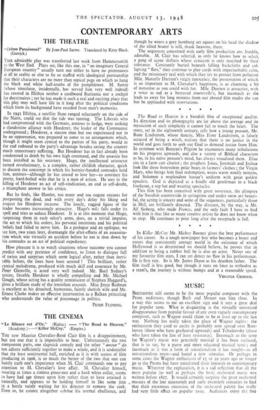CONTEMPORARY ARTS
THE THEATRE
"Crime Passionnel" By jean-Paul Sartre. Translated by Kitty Black. (Garrick.) "Crime Passionnel" By jean-Paul Sartre. Translated by Kitty Black. (Garrick.)
THIS admirable play was transferred last week from Hammersmith to the West End. Plays set, like this one, in "an imaginary Central European country" usually turn out either to have no pretensions at all to reality or else to be so stuffed with ideological partisanship that their characters are no more than topical pegs on which to hang the black and white half-truths of the pamphleteer. M. Sartre (whose translator, incidentally, has served him very well indeed) has created in Illithya neither a cardboard Ruritania nor a cockpit for doctrinaires ; yet he has made it such a real and exciting place that this play may well have life in it long after the political conditions which form its background have receded from men's memories.
In 1943 Illithya, a satellite State ranged reluctantly on the side of the Nazis, could see that the tide was turning. The Liberals who had compromised with the Germans, anxious to hedge, were seeking a clandestine alliance with Hoederer, the leader of the Communist underground ; Hoederer, a sincere man but too experienced not to be an opportunist, was prepared to come to an arrangement which, though it might seem cynical to the purists of his party, would in the end redound to the party's advantage besides saving the country much unnecessary suffering. But Hoederer has in fact already been condemned to death by his own high command, and the assassin has been installed as his secretary. Hugo, the intellectual aristocrat turned revolutionary, is a complex, rather childish character, quick to discern the contempt in which his hornier-handed comrades hold him, anxious—although he has ceased to love her—to convince his pretty, hard-boiled wife that he is a man of action. He sees in the killing of Hoederer an act of self-vindication, an end to self-doubt, a triumphant answer to his critics.
But he finds, like Hamlet, too many and to cogent excuses for postponing the deed, and with every day's delay his liking and respect for Hoederer increase. The lonely, rugged figure of the leader becomes increasingly attractive. Hugo's wife falls under its spell and tries to seduce Hoederer. It is at this moment that Hugo, surprising them in each other's arms, does, on a trivial impulse, the act to which his orders, his personal intentions and his political beliefs had failed to nerve him. In a prologue and an epilogue, we see him, two years later, disentangle the after-effects of an assassina- tion which was virtually an accident before he too is shot down by his comrades as an act of political expediency.
How pleasant it is to watch situations whose outcome you cannot predict with any pretence of confidence, to listen to dialogue full of twists and surprises which seem logical after, rather than inevi- table before, the lines have been uttered ! This brilliant, rather cynical melodrama, produced with much skill and assurance by Mr. Peter Glenville, is acted very well indeed. Mr. Basil Sydney's ursine, likeable Hoederer is wholly compelling and Mr. Michael Gough, whose acting has a quality reminiscent of Stephen Haggard's, gives a brilliant study of the irresolute assassin. Miss Joyce Redman is excellent as his detached, humorous, faintly sluttish wife and Mr. Ernest Clarke makes an effective intervention as a Balkan princeling who understands the value of pistonnage in politics.
PETER FLEMING.


































 Previous page
Previous page